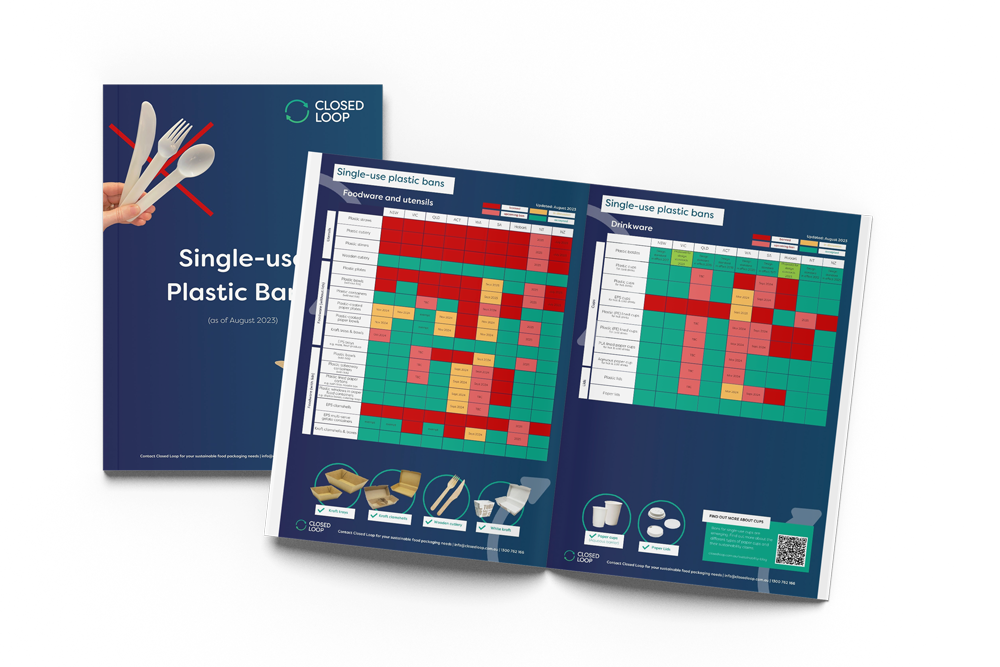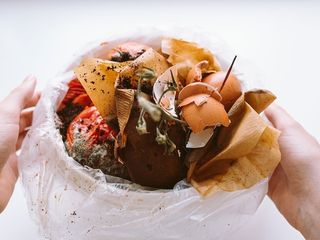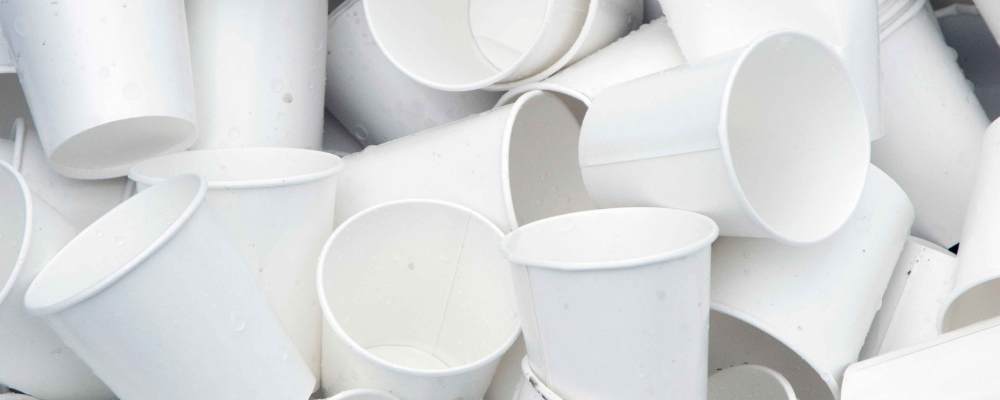Single-use plastic ban
Plastic has been around for years, and that’s a problem. If plastic is not recycled correctly, it causes environmental issues such as releasing methane (which contributes to climate change) and threatening our wildlife, for example marine animals can mistake plastic for food and ingest or choke on the plastic.
What is the single-use plastic ban?
There is a voluntary target for states to phase out certain problematic plastic products by 2025 under the National Waste Policy Action Plan.
The single-use plastic ban is a result of this voluntary target. Each state is responsible for their own policies and actions towards the National Waste Policy Action Plan. Because of this, the single-use plastic ban will look different in each state. See our state breakdown below to find out more.

Each state and territory has their own bans and regulations on single-use plastic.
State by State Breakdown
Victoria
Current single-use plastic bans in VIC:
- Plastic straws, stirrers, cutlery, plates.
- Cotton buds with plastic shafts.
- EPS foodware and cups.
- Lightweight plastic shopping bags.
- Plastic-coated paper plates.
- Exemptions apply. See here for more information.
Acceptable alternatives:
- If you can’t use reusable materials (metal or silicone), consider uncoated paper, wood or bamboo alternatives. Note that items containing compostable plastic or ‘plant-based’ plastic are not allowed.
Upcoming single-use plastic bans in VIC:
From Jan 2026
- Plastic drinking straws, stirrers, cutlery, plates when they are pre-packaged into a food or beverage product by a mechanical process (e.g. straw attached to juice box, plate in a frozen meal).
- Compostable plastic alternatives are also banned. The ban applies where the items are sold or supplied for free, and where they are provided individually or in packets.
New South Wales
Current single-use plastic bans in NSW:
- Plastic straws, stirrers, cutlery, plates, bowls (without lids).
- Cotton buds with plastic shafts.
- EPS food service items.
- Lightweight plastic shopping bags (includes compostable or bioplastic alternatives).
- Plastic microbeads in rinse-off personal care products.
- Plastic-coated paper plates and bowls
- A list of current exemptions can be found here.
Acceptable alternatives:
- If you can’t use reusable materials (metal/ceramic or silicone), consider uncoated paper, wood or bamboo alternatives. Full list of alternatives can be found here.
Upcoming single-use plastic bans in NSW:
In discussion:
- Plastic foodware such as plastic containers, bowls with lids, lids and food containers with a plastic window
- Drinkware such as plastic cups and lids for hot and cold drinks and plastic or non-plastic coated cups for hot and cold drinks
Queensland
Current single-use plastic bans in QLD:
- Plastics straws, stirrers, cutlery, plates, bowls and EPS food ware.
- Lightweight plastic bags (including compostable, degradable and biodegradable).
- Cotton buds with plastic stems
- EPS loose packaging
- Heavyweight plastic shopping bags
- Plastic microbeads in rinse-off personal care and cleaning products
- Exemptions apply see here.
Acceptable alternatives:
- Certified AS 5810 and AS 4736 are compliant with the QLD single-use plastic ban, excluding lightweight plastic bags.
- Items with general terms such as ‘biodegradable’ or TUV/OK Compost are not compliant.
Upcoming single-use plastic bans in QLD:
In discussion:
- Other EPS packaging, coffee cups, sauce sachets, bread tags, produce bags and other items
Australian Capital Territory
Current single-use plastic bans in ACT:
- Plastic straws, stirrers, cutlery, plates, bowls (without lids).
- Cotton buds with plastic sticks.
- EPS loose fill packaging.
- EPS trays and containers.
- Lightweight plastic shopping bags (includes compostable or bioplastic alternatives).
- Plastic microbeads in rinse-off personal care and cleaning products.
- Oxo-degradable plastics.
- Plastic coated paper plates and bowls.
- Heavyweight and boutique plastic bags (greater than 35 microns in thickness).
- Exemptions apply. Find out more.
Acceptable alternatives:
- Compostable items that are to Australian composting standard AS 4736 or AS 5810.
- See a full list of alternative options here.
Western Australia
Current single-use plastic bans in WA:
- Plastic cups and lids for hot drinks (including PE and PLA lined single-use cups).
- Plastic straws, cutlery, stirrers.
- Plastic plates, bowls (without lids) and containers (without lids).
- Plastic coated paper plates and bowls.
- Plastic cups for cold drinks.
- EPS trays (meat, fresh produce etc.), clamshells and multi-serve gelato containers.
- Balloon releases (Helium).
- Paper bags with plastic laminate.
- Lightweight and heavyweight plastic shopping bags.
- EPS cups (for hot and cold drinks).
- EPS loose fill for packaging.
- Plastics with ‘degradable’ additives.
- Cotton buds with plastic shafts.
- Plastic bowls (with lids), plastic takeaway containers (with lids), plastic lined paper cartons (e.g., sushi tray, noodle box), plastic windows in paper food containers (display boxes, catering trays).
- Produce/barrier bags (for fruit and veg).
- EPS moulded packaging
- Exemptions may be granted to a person or class of persons for a banned item. Businesses can apply for a single use plastics ban exemption here.
Acceptable alternatives:
- A full list of alternative packaging options is available here.
South Australia
Current single-use plastic bans in SA:
- Plastic cutlery, beverage stirrers, drinking straws.
- EPS cups, bowls, plates and clamshell containers.
- Oxo-degradable plastic products.
- Plastic plates and bowls.
- Cotton buds with plastic shafts.
- Pizza savers.
- Thick supermarket or boutique plastic bags.
- Plastic barrier bags (for fruit and vegetables).
- Plastic confetti and balloon stick ties.
- Plastic bread tags.
- Plastic food containers.
- EPS consumer food and beverage containers.
- Plastic cups and lids for hot and cold drinks
- Non-certified compostable coffee cups and lids (AS 5810/AS 4736 will be accepted)
- Plastic soy sauce fish.
- Plastic fruit stickers.
- Pre-packaged and attached products (e.g. straw on fruit drink box).
- Exemptions apply. Find out more here.
Acceptable alternatives:
- Information on reusable and compostable alternatives can be found here.
Hobart
Current single-use plastic bans in Hobart:
- Plastic bowls, plates, stirrers, cutlery, takeaway food containers and lids, cups, straws.
- EPS clamshells.
- Sauce sachets.
- Plastic lined paper cartons (e.g. noodle boxes).
- Plastic lined paper cups.
- Plastic sandwich wedges.
- Plastic lids on takeaway cups.
- Lightweight shopping bags.
- This ban applies to single-use plastic containers with a volume less than 1 litre or an area equivalent to an A4 piece of paper (210mm x 297mm). The ban does not apply to businesses if the customer provides their own food packaging (such as, coffee cups or reusable containers) or the food packaging was not provided to the customer by the retailer (such as, a pre-packaged soft drink bottle).
Acceptable alternatives:
- Australian Standard AS 4736
- European Standard EN 13432
- United States of American standard D6 400
- A full list of compliant packaging can be found here.
Northern Territory
Current single-use plastic bans in NT (Darwin):
- Disposable coffee and smoothie cups.
- Lightweight shopping bags.
Acceptable alternatives:
- Certified AS 5810 and AS 4736 are compliant with the NT ban.
Upcoming single-use plastic bans in NT (Darwin):
- Plastic lids, straws, cutlery, stirrers, plates, bowls and takeaway containers.
- Plastic coated paper plates and bowls.
- EPS hot and cold drink cups, trays, clamshells and multi-serve gelato containers.
- Balloons.
- Plastic microbeads in rinse-off personal care and cleaning products.
- Heavyweight plastic shopping bags.
- EPS loose fill and moulded packaging.
New Zealand
Current single-use plastic bans in NZ:
- Plastic cotton buds.
- Plastic plates, bowls, cutlery, straws and stirrers.
- Plastics with pro-degradant additives.
- Certain PVC food trays and containers.
- EPS takeaway food and beverage packaging.
- Plastic produce bags.
- Plastic produce labels.
- Lightweight plastic shopping bags.
- There are exemptions for each of the items above. Find out more here.
Acceptable alternatives:
- A full list of alternatives for each item can be found here.
Upcoming single-use plastic bans in NZ:
- All other PVC and polystyrene food and drink packaging.
Who does it effect?
Environment:
The single-use plastic ban was designed for environmental benefit. Minimising single-use plastic will:
- Reduce litter on streets, waterways and public spaces
- Reduce climate change impacts from methane produced by single-use plastics
- Reduce wildlife harm from food contamination, ingestion and entanglement
- Marginally reduce reliance of fossil fuels for creation of single-use plastics
Packaging manufacturers:
Manufacturers of single-use plastic products will have to find alternative solutions to their plastic production. Closed Loop have been phasing out single-use plastic through our sustainable packaging options.
Packaging logistics:
Suppliers and distributors are also changing their behaviours to move towards alternative solutions. This can include bamboo utensils, eco-friendly packaging or plastic free cups.
Consumers:
Most consumers are unaware of the impact of single-use plastics. The ban will enable behaviour change and discussion on problematic material use.
Single-use plastics are not necessarily the issue
Some single-use plastics such as coffee cups with plastic linings can be collected and recycled via Simply Cups (Australia’s Largest Paper Cup Recycling Program).
For Australians to really reduce our impact on the environment and contribute less to landfill, we need to follow and educate on the waste hierarchy and REFUSE or REDUCE our virgin plastic requirements.
This can mean using a reusable coffee cup instead of a single-use coffee cup, or refusing single-use cutlery when ordering take-away. As a business, there are a range of possibilities to reduce your plastic intake. Contact us for a circular economy consult today.
The packaging ranges previously sold by Closed Loop, plus much more, can now be sourced through PAC Trading. Contact PAC via email at dispatch@pactrading.com.au or their website https://www.pactrading.com.au.





